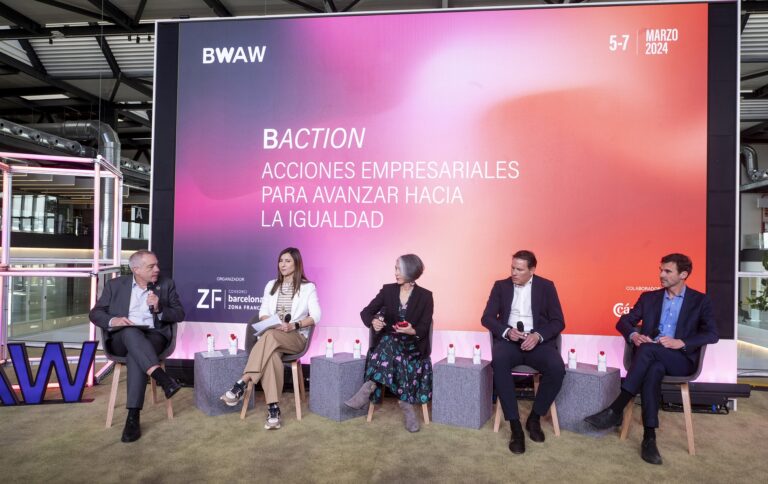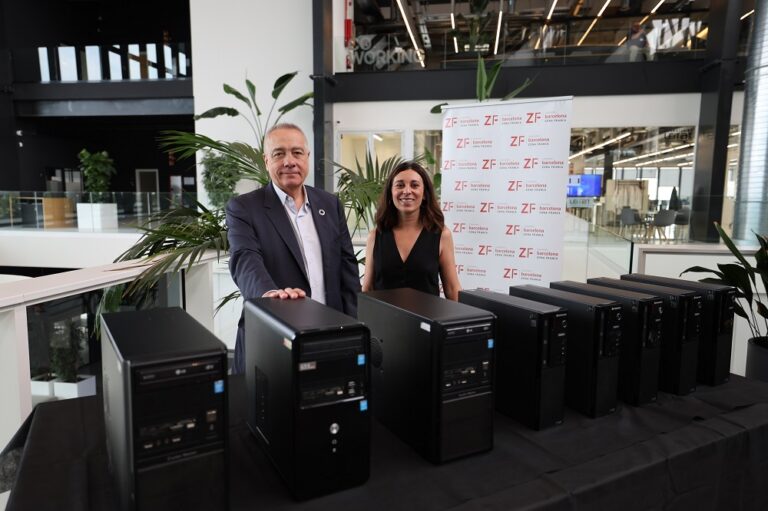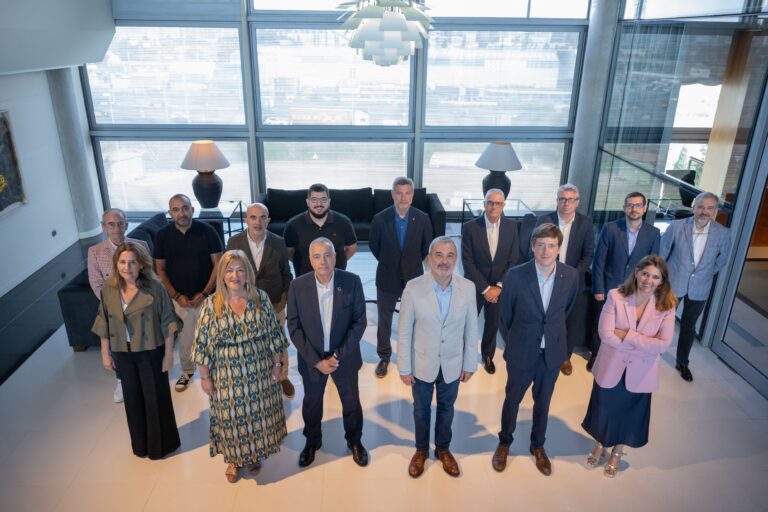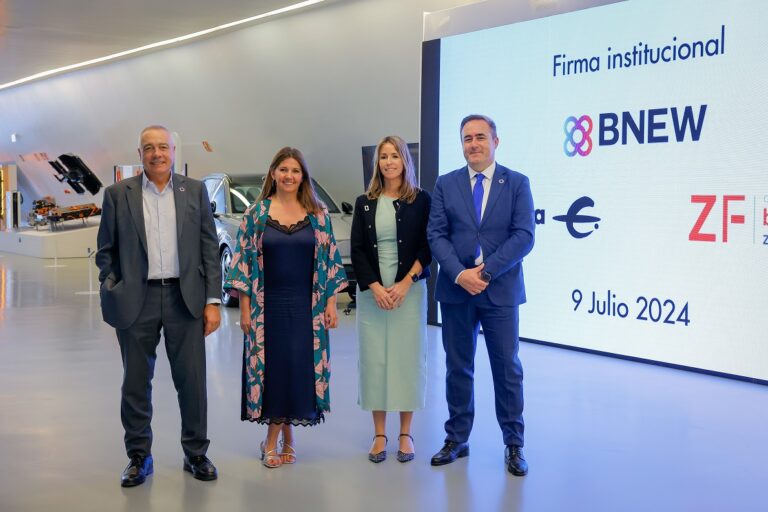BWAW 2024 ends its 4th edition with the participation of 2.617 professionals

7 de March de 2024
- The benchmark event for advancing gender equality brought together 67 high-level speakers distributed in 14 sessions, with 2.617 professionals who followed its sessions either in person or through the online platform
- Pere Navarro, special delegate of the State in the CZFB, has highlighted the vital objective of the event: “BWAW was designed to visualize the pending problems or challenges in terms of gender equality and also to highlight all those women who are in masculinized economic sectors”
Barcelona, March 7, 2024.- The Barcelona Woman Acceleration Week (BWAW) puts today the finishing touch to the fourth edition by achieving an increase in attendance, both online and in person. The benchmark event for advancing gender equality in the business sector has once again become a great parity debate to reflect on the position of women in society and in the workplace, especially in areas where women have a smaller presence, such as in industry.
In these three days, more than 2.600 attendees attended the presentations to enjoy the content, either in person at DFactory Barcelona or online through the digital platform. Promoted by the Consorci de la Zona Franca de Barcelona (CZFB) with the collaboration of the Incyde Foundation of the Spanish Chambers of Commerce, this fourth edition has brought together 67 high-level speakers, both national and international, structured in 14 debate sessions that have offered solutions and proposals to progress in terms of parity and equal opportunities.
Gender perspective and youth talent
The day began with the BEducation vertical and the session “The gender perspective in the creation of young talent” moderated by Juan Castilla, CEO and founder of Talent Factory, and the high-level speakers: Esther Elías, CEO of FunTech Rocket; Eugenia Llopart de Mercader, CEO and founder of Lapso Studios; Claudia Pierre Trias de Bes, CEO de Meeting Lawyers and Álvaro Pintado, founder and administrator of hello.app.
As presented in the panel, Spain ranks fourth in the 2023 Gender Equality Index, improving its position compared to previous years. Even so, there is a marked gender disparity in entrepreneurship and in the Spanish tech sector, where the majority of founding teams in tech companies are made up of men, limiting opportunities for women. The speakers also highlighted that, despite progress, a significant pay gap between men and women persists in Spain, with women earning 17% less than men for the same work. In conclusion, in order to move towards gender equality in entrepreneurship and work-life balance, it is essential to encourage women to embark on entrepreneurship, allow themselves to make mistakes and learn to reconcile with their partners.
Companies that move towards equality
The morning continued with the BAction vertical and the debate “Business actions to move towards equality” moderated by Pere Navarro and featuring the professional experiences of: Marta Batalla, member of the board of directors of bonÀrea; Eulalia Flo, CEO of Equinix Spain; Jordi Sardina, general manager IVECO ZFAS and Pablo Vilanova, general manager of Mercabarna.
During the session, it was pointed out that only 24% of Spanish companies have an Equality Plan. In the specific case of the agri-food sector, the need for female public role models was highlighted. In addition, it was pointed out that 29% of agricultural companies are run by women. It was also pointed out that companies with 30% of women in senior positions can generate up to 60% of economic benefits compared to committees where there are no women. Finally, the integration of gender equality values in the business culture was highlighted as a central point to be addressed in order to achieve a greater presence of women and to attract talent and, at the same time, retain it in companies.
Internationalization of female talent
Lunchtime continued with the penultimate BInternational vertical and the debate session “The internationalization of female talent” moderated by Blanca Sorigué and featuring presentations by: Giovanna Carnevali, Urban Planning Advisor; Mireia del Pozo, president of CEDE; Belén Marrón, director and director at Belén Marrón and Isabel Martínez-Cosentino, board of directors, innovation committee and city manager at Cosentino.
According to the World Bank, women currently make up 40% of the global workforce. And according to the INE, almost 3 million Spaniards are living abroad; of these, 60% are women. In this sense, with regard to the internationalization of female talent, it is worth taking into account the fundamental role of public universities in our country, which play a very important role in training new talent to meet the productive and practical demands of the labour market. Two challenges to consider are: on the one hand, to improve the English level of workers and students, and on the other, to build bridges of collaboration between all female talent, to immerse ourselves in new cultures and to make all knowledge and talent more transversal worldwide. In summary, international trade represents 62% of Spain’s GDP and women must be represented in the sector, whether they are expatriates, as part of the management and board of directors of a company or as entrepreneurs, and to achieve this it is necessary to address social, cultural, personal and business challenges.
The fourth edition of BWAW has ended with the vertical BHealth with the discussion session “The inverted female pyramid in the health sector” moderated by Marja Huiskamp, communications director of Barcelona Health Hub and with the speakers: Sara Alvarellos, manager at NTT DATA; Elena Álvarez, president and co-founder of Mujeres en Farma; Sara Berbel, Director of Empowerment Hub and Elena Fontan, Digital Purchasing Manager at Roche.
Maximum interest from companies from various sectors
In this edition, the topics have addressed solutions that allow progress in terms of parity, equal opportunities and promotion of women in areas such as education, health, audiovisual, legal, leadership, the public sector or industry 4.0.
In this sense, Blanca Sorigué, general director of the CZFB, remarked that “BWAW is a hybrid event, aimed at the world, which talks about gender equality in a business environment, in any type of sector of activity, since not everyone is the same, but everyone is committed. With BWAW we manage to raise awareness throughout society about an issue that concerns us all. I am very proud because we have been counting this edition for four years now, and we are seeing a very positive evolution, although it is clear that, as a society, we still have a long way to go to achieve real gender equality”.
For his part, Pere Navarro, special delegate of the State in the CZFB, stressed that “BWAW was designed to visualize the pending problems or challenges in terms of gender equality and also to highlight all those women who are in masculinized economic sectors. From the CZFB we promote the 17 SDGs, including SDG 5 that addresses gender equality, because it is vital that our actions reflect that value; Women represent half of the population and therefore half of the professional talent.”



